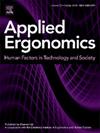Effects of dynamic thermal conditioning on cognitive load and performance in an office environment
IF 3.1
2区 工程技术
Q2 ENGINEERING, INDUSTRIAL
引用次数: 0
Abstract
In the design of buildings with minimal environmental impact, the incorporation of higher energy flexibility is becoming increasingly relevant. This approach is associated with dynamic modulations in setpoint temperatures. Until now, a link between indoor temperatures and cognitive performance of workers has been assumed, leading to high energy consumption and overcooling of office environments in summer conditions. However, research focusing on the relationship between thermal indoor environments and cognitive performance has rarely considered the influence of dynamic temperatures or temporal effects. This is the first experimental study aiming to understand the impact of temperature in relation to time of day on the subjective perception of cognitive load and performance under various thermal conditions in real-world office environments. The results indicated no observable relationship between temperature setpoints (25–30 °C) and cognitive performance. Instead, the temporal dynamics of cooling rather than fixed and static temperature setpoints appeared to have an impact.
动态热调节对办公室环境中认知负荷和工作表现的影响
在设计对环境影响最小的建筑物时,采用更高的能源灵活性正变得越来越重要。这种方法与设定温度的动态调节有关。迄今为止,人们一直认为室内温度与工人的认知能力之间存在联系,这导致了夏季办公环境的高能耗和过冷。然而,关注室内热环境与认知能力之间关系的研究很少考虑动态温度或时间效应的影响。这是第一项实验研究,旨在了解在真实世界的办公环境中,在各种热条件下,温度与时间的关系对认知负荷的主观感知和认知表现的影响。研究结果表明,温度设定值(25-30 °C)与认知表现之间没有明显的关系。相反,制冷的时间动态而不是固定和静态的温度设定点似乎会产生影响。
本文章由计算机程序翻译,如有差异,请以英文原文为准。
求助全文
约1分钟内获得全文
求助全文
来源期刊

Applied Ergonomics
工程技术-工程:工业
CiteScore
7.50
自引率
9.40%
发文量
248
审稿时长
53 days
期刊介绍:
Applied Ergonomics is aimed at ergonomists and all those interested in applying ergonomics/human factors in the design, planning and management of technical and social systems at work or leisure. Readership is truly international with subscribers in over 50 countries. Professionals for whom Applied Ergonomics is of interest include: ergonomists, designers, industrial engineers, health and safety specialists, systems engineers, design engineers, organizational psychologists, occupational health specialists and human-computer interaction specialists.
 求助内容:
求助内容: 应助结果提醒方式:
应助结果提醒方式:


